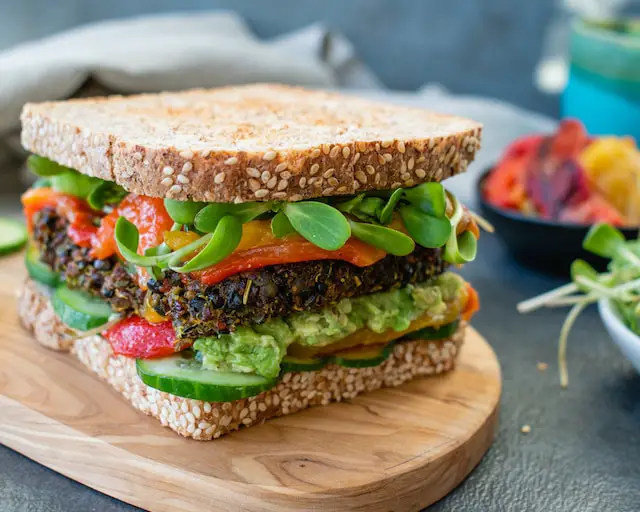Veganism and vegetarianism are both dietary choices that involve consuming plant-based foods. Vegetarians do not consume meat but may still include dairy products, eggs, and other animal byproducts in their diet. Vegans take it a step further by eliminating all animal-derived products completely from their lifestyle.
What is veganism?
(Photo by The Matter of Food on Unsplash )

Veganism is a lifestyle that involves avoiding all animal products, including meat, dairy, eggs, and even honey. Vegans often choose this way of living for ethical reasons related to animal welfare or environmental concerns.
One of the key principles of veganism is the belief that animals should not be used as commodities for human consumption. This means avoiding any food or product that contains animal-derived ingredients or has been tested on animals.
In addition to diet choices, many vegans also make conscious decisions about other aspects of their lives beyond just food – such as clothing made from leather or wool.
While it may seem difficult at first to eliminate so many common staples from your diet and daily life, with time vegans find creative alternatives and enjoy discovering new plant-based foods they never tried before.
Ultimately though it’s important to remember that veganism isn’t just a fad diet but rather a lifestyle choice centered around making more mindful and compassionate choices for both ourselves and the planet we call home.
What is vegetarianism?
(Photo by Brooke Lark on Unsplash )

Vegetarianism is a dietary practice that involves abstaining from meat, fish, and poultry. Some vegetarians also avoid other animal products such as dairy and eggs. There are several reasons why people choose to follow a vegetarian diet, including ethical concerns about animal welfare, environmental sustainability issues related to factory farming practices, and health considerations.
There are several different types of vegetarians. Lacto-ovo vegetarians consume dairy products and eggs but avoid meat. Lacto-vegetarians include dairy in their diets but not eggs or meat. Ovo-vegetarians eat eggs but not dairy or meat.
Plant-based diets have been associated with numerous health benefits, including reduced risk for heart disease, certain cancers like colon cancer, type 2 diabetes mellitus (T2DM), obesity levels reduction among others.
However it’s important to note that some vegetarians may struggle to get enough protein in their diet if they’re not careful planning their meals properly; this can be especially challenging for vegans who do not consume any animal products at all.
Vegan Vs. Vegetarian – Key differences
When it comes to dietary preferences, the terms “vegan” and “vegetarian” are often used interchangeably. However, there are key differences between these two lifestyles.
Vegetarians typically abstain from eating meat, poultry, and fish. They may still consume dairy products like milk and cheese or eggs. In contrast, vegans avoid any animal-based foods altogether – including dairy and eggs.
Another notable difference is in the reasons behind each lifestyle choice. While some vegetarians choose their diet for health reasons or ethical concerns about factory farming practices, many also continue to consume animal products for various personal reasons.
Vegans take their avoidance of animal-based foods a step further by avoiding all forms of animal exploitation entirely. This includes not using leather goods or other items derived from animals in everyday life.
While both vegans and vegetarians make conscious choices about what they eat based on ethics or health concerns, the key difference lies in the extent of their commitment to an animal-free lifestyle.
Pros and cons of veganism and vegetarianism
Both veganism and vegetarianism have their fair share of pros and cons. One of the main benefits of a plant-based diet is that it can lead to better health outcomes, such as lower rates of heart disease, obesity and type 2 diabetes.
On the other hand, some people may struggle to obtain enough protein on a vegan or vegetarian diet without proper planning. Additionally, certain nutrients like vitamin B12 and iron are more difficult to obtain from plant-based sources.
Another advantage of both diets is that they can be environmentally friendly due to the reduced impact on animal agriculture. However, some argue that monoculture crops used in large-scale vegan food production contribute to soil degradation and habitat loss.
When it comes to ethics, vegans often cite avoiding harm towards animals as one of their core motivations for adopting a plant-based lifestyle. Vegetarians may choose this option for similar reasons but still consume dairy products or eggs sourced from farms with humane practices.
There are many factors at play when considering whether a vegan or vegetarian diet is right for you. It’s important to weigh up the various pros and cons before making any dietary changes- ultimately what works best will vary from person-to-person depending on individual needs!
Pros and cons of vegetarianism
Vegetarianism is a dietary choice that involves abstaining from meat, fish, and poultry. While this lifestyle has its benefits, it also has some drawbacks.
One of the advantages of vegetarianism is that it can help maintain a healthy weight due to the consumption of high-fiber foods such as fruits and vegetables. This diet reduces the risk of heart disease by lowering cholesterol levels in your body. Vegetarians also tend to consume fewer calories than meat-eaters, which leads to lower rates of obesity.
Another benefit is that vegetarians are more likely to have better gut health due to consuming more fiber-rich foods than non-vegetarians. A plant-based diet provides an ample amount of antioxidants and phytonutrients required for good skin health.
On the other hand, one major disadvantage is that vegetarians may face nutrient deficiencies such as vitamin B12 and iron deficiency since these nutrients are commonly found in animal products. Additionally, vegetarian diets could be restrictive or difficult for individuals who have allergies or intolerances towards certain types of food like gluten or soy products.
While there are pros and cons associated with adopting a vegetarian lifestyle, ultimately it depends on individual preferences, goals and overall health status.
What are the 4 types of vegans?
As more people become interested in plant-based diets, it’s important to understand the different types of vegans. Here are the four main categories:
- Dietary Vegans: This is the most common type of vegan, and they avoid consuming any animal products such as meat, dairy, eggs or honey.
- Ethical Vegans: They not only follow a plant-based lifestyle but also reject using any products that come from animals such as leather or wool.
- Environmental Vegans: These vegans follow this diet for environmental reasons and aim to reduce their carbon footprint by avoiding meat consumption which is responsible for greenhouse gas emissions.
- Health Veganism: They adopt this diet due to health concerns and believe that plant foods can provide better nutrition than animal-based ones.
It’s important to note that each person’s reason for following a vegan lifestyle is unique; there are no set rules on what type of veganism one should practice. It all comes down to personal preferences and beliefs!
What do vegans not eat?
As a vegan, you might be wondering what types of foods are off-limits. Well, vegans avoid all animal-derived products and by-products in their diet. This means no meat, poultry or fish.
But it doesn’t stop there! Vegans also don’t consume dairy products like milk, cheese, and yogurt because they come from cows or other animals. Additionally, vegans don’t eat eggs since they come from chickens.
Honey is another food that’s not included in the vegan diet since it’s produced by bees. Some processed foods may also contain hidden animal ingredients like gelatin or lard which should be avoided as well.
In addition to avoiding certain foods, many vegans opt for a plant-based lifestyle that avoids leather goods made from animal hides such as shoes or purses.
Being vegan requires careful attention to what we put into our bodies and how we live our lives while respecting the environment around us.
Featured Image By – Anna Pelzer on Unsplash








